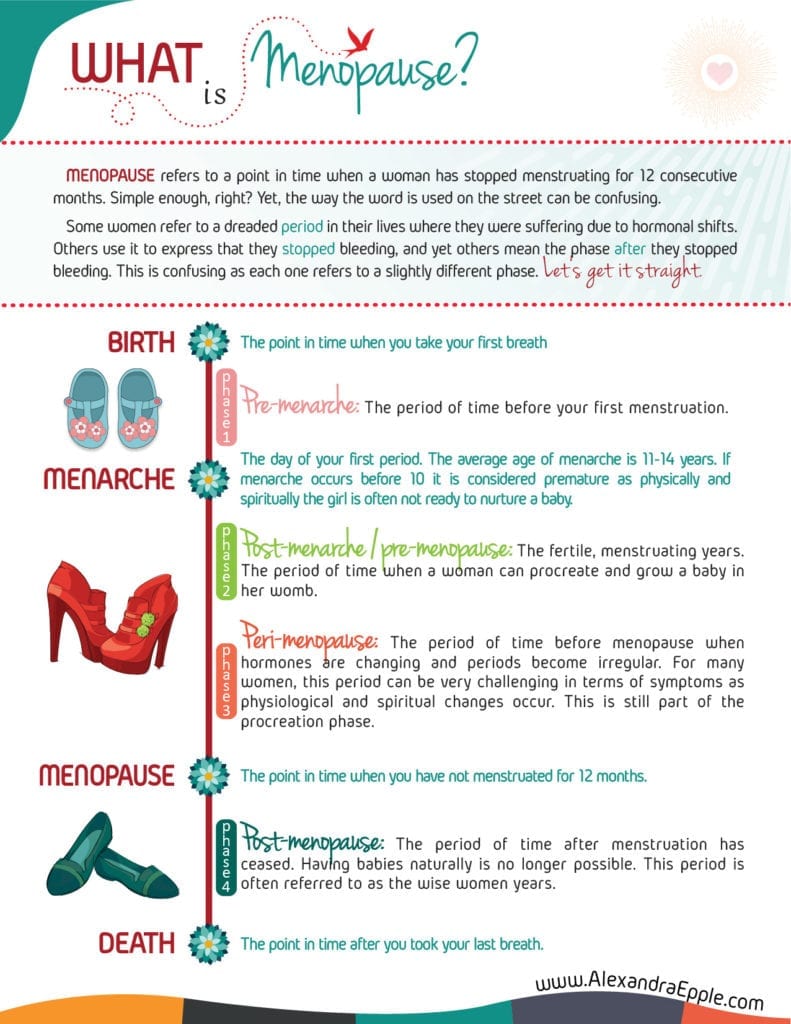
Free Yourself from Menopause Confusion – Get the Facts and Listen to Your Body
Menopause seems to have developed into a mysterious and massive beast every woman has to face at some point in her life. Most women know the word menopause, but few have taken the time to investigate what menopause actually is.
You may have had a friend or family member that has gone through “The Change” and have heard horror stories about menopause that linger in the back of your mind. This can result in fear and anxiety about what’s up ahead.
Maybe you got lucky and haven’t heard such stories and menopause doesn’t evoke panic or fear. Yet, you know that menopause is happening to every woman, and questions about it are hovering over your shoulders as you enter your 40s and 50s. When menopausal symptoms hit suddenly and unexpectedly, an unprepared woman can feel disempowered in finding a way to deal with these symptoms.
On the other side of the coin, identifying oneself too much with the word menopause can lead to obsession. Overall having a plan to educate oneself is good. Entering into menopause without a clue is like going into the wild without survival guide.
I think it’s important to start with a couple of super basic questions: What is menopause, how do I know I have arrived and is it important to identify with the label in the first place?
What exactly is Menopause?
Menopause is defined as the natural cessation of menstruation. In other words, if you have not had your period for 12 or more months, menopause has arrived, according to the allopathic model. You no longer bleed and you no longer are able to bear children. Past that one year mark, you are in post-menopause.

What is Perimenopause?
Pinpointing perimenopause is a different story. Perimenopause is defined as a period of time that precedes menopause. On average perimenopause lasts one to ten years. During this time, periods become irregular which is perfectly normal. The body is done with having children and irregular periods are it’s way of communicating this.
There is no specific marker for peri-menopause. For years, a combination of a set of symptoms and age were used to infer that indeed perimenopause had arrived. Some of those symptoms are irregular periods, hot flashes, brainfog, unusual weight gain or loss, slower metabolism, heart palpitations and vaginal dryness to name just a few.
Lab Tests can be Helpful
Today you could get clarity on whether or not you are in perimenopause by having your hormones tested. Some hormones that can be tested are estrogen, progesterone, testosterone, DHEA, thyroid hormone and FSH/LH. Hormones can be either tested via the blood or the saliva. During perimenopause the levels of estrogen and progesterone start to drop indicating “The Change” has arrived.
 Laboratory tests of hormone levels maybe helpful to rule out other diseases. Perimenopause mimics other illnesses rather convincingly such as thyroid problems, stress, mental/emotional issues, polycystic ovarian syndrome or amenorrhea (abnormal absence of menstrual periods).
Laboratory tests of hormone levels maybe helpful to rule out other diseases. Perimenopause mimics other illnesses rather convincingly such as thyroid problems, stress, mental/emotional issues, polycystic ovarian syndrome or amenorrhea (abnormal absence of menstrual periods).
Lab tests of hormones have pitfalls though. Hormone tests are only a snapshot in an ever changing process of fluctuating hormones. Hormones fluctuate monthly within a women’s cycle and even daily. Tests should be taken with a grain of salt and only as a general indicator, rather than a black and white ultimatum. Also be aware that if you get your hormones tested by an allopathic doctor they are likely to prescribe hormone replacement therapy (HRT) to treat your symptoms. Doctors will either prescribe conventional hormone replacement HRT or bio identical hormones if hormone levels are inadequate. HRT is the therapy that medical doctors are trained to administer. It’s their specialty, if you will. They are not trained in herbs, diet or lifestyle–and no blame here. Hormone testing can be valuable as a baseline, but taking HRT makes little sense unless you are in total crisis mode. HRT messes with your body’s innate ability to regulate itself and it increases your risk of cancer, most notably uterine and breast cancer, strokes and heart attacks.
First and Foremost Listen to Your Own Body
 Besides testing hormones, the other option is to check in with your body and ask what it needs. For some women who have internalized the allopathic model of healthcare, tuning into the body’s inherent wisdom may seem woo woo. Yet listening to the body is the preferred method of ‘treatment’ even espoused by well respected MDs such as Christianne Northrop. It is also the healing method of choice from an Ayurvedic perspective as well as so many other holistic healing modalities. Yes we use diagnostic tools, coaches, counselors, healthcare practitioners, massage therapists and so many others on the path to help us heal, yet ultimatly the final word needs to come from the body. Listening to your own body is an empowered way to heal yourself.
Besides testing hormones, the other option is to check in with your body and ask what it needs. For some women who have internalized the allopathic model of healthcare, tuning into the body’s inherent wisdom may seem woo woo. Yet listening to the body is the preferred method of ‘treatment’ even espoused by well respected MDs such as Christianne Northrop. It is also the healing method of choice from an Ayurvedic perspective as well as so many other holistic healing modalities. Yes we use diagnostic tools, coaches, counselors, healthcare practitioners, massage therapists and so many others on the path to help us heal, yet ultimatly the final word needs to come from the body. Listening to your own body is an empowered way to heal yourself.
Develop your Intuition
You spend 24/7 with your body. If you take the time to listen in, you will get more information than a “single point in time test.” By learning your body language, you will develop an ability to listen to your body’s own wisdom. You will learn to perceive and understand much more than a lab test will ever be able to give you. Some signs to pay attention to are your elimination, digestive issues, appetite, energy level, body aches, skin impurities, menstrual patterns and mood patterns just to name a few.You just need body language education to develop a proper communication system, so you can trust your body’s wisdom.Never underestimate your ability to know your own body. The ability to listen to the subtle messages moving through you all day, every day is priceless. Here are three ways I recommend to strengthen your intuition and ability to listen to the body’s vast inherent wisdom:
- Do bi-yearly detoxes to bring your physical body back to a more balanced state. When the body is far out of balance, it craves what keeps it out of balance. When the body is close to balance, it craves what keeps it in balance. Regular detoxes will give you a big jolt forward to a more balanced physiology and eliminate what you no longer need.
- Follow a daily rhythm and routine that allows the body to detox gently on a daily basis. Any Yoga Health Coach can help you develop daily routines that support health and detoxification.
- Establish practices that help you tap into your intuition. Listen to the podcast “how to awaken intuition and trust your soul’s calling” for tips on how to awakened to your intuition.
But let’s go back to our original question, “how do you know you are in perimenopause” and does it really matter if you know it or not?
Does the Question “Perimenopause or Not” Really Matter?
Truth be told, menopause is not a disease. It is a natural transition in a woman’s life that is gradual, over a period of time. Menopause is not mentioned anywhere in the traditional medical texts of Ayurveda i.e. it doesn’t have a label. You could look up individual symptoms like weight gain, constipation or emotional disturbances in Ayurvedic texts, but there is no dedicated section for menopause. If it was a significant ‘disease’ wouldn’t you think it would have it’s own section?
Labeling symptoms with perimenopause or menopause is certainly a convenient way to communicate about these natural changes. And it allows researchers to find data and averages. In general, however, labels can lead to obsession and false identification. They can lead one to be potentially disempowered about the healing process. What if we dropped the label and simply looked at the symptoms and treated those?
While labels are helpful for communication’s sake, IDENTIFICATION with that label is not helpful for true healing.
The words of my friend’s Ayurvedic physician who was obsessed with menopause come to mind as I finish up this blog. “Just drop the word menopause. Just drop it”. Instead of grappling with the question “have I arrived or not?” Ask yourself empowering questions about your health:
- What symptoms am I experiencing?
- What Ayurvedic qualities do those symptoms have (light or heavy, moist or dry, mobile or stable…)?
- How can I get the opposite qualities back into my body via diet and lifestyle?
- What habits have I cultivated to get me to this imbalanced place?
Looking at your symptoms rather than the label “menopause” allows you to see yourself, not the concept and thus empowers you to make the changes you need to make.
To learn more about menopause, sign up for my free video series “The 5 secrets to a better menopause”. We talk about menopause being an opportunity, what treatment approach makes sense and how you can use your habits and diet to get back to comfort in your body.


